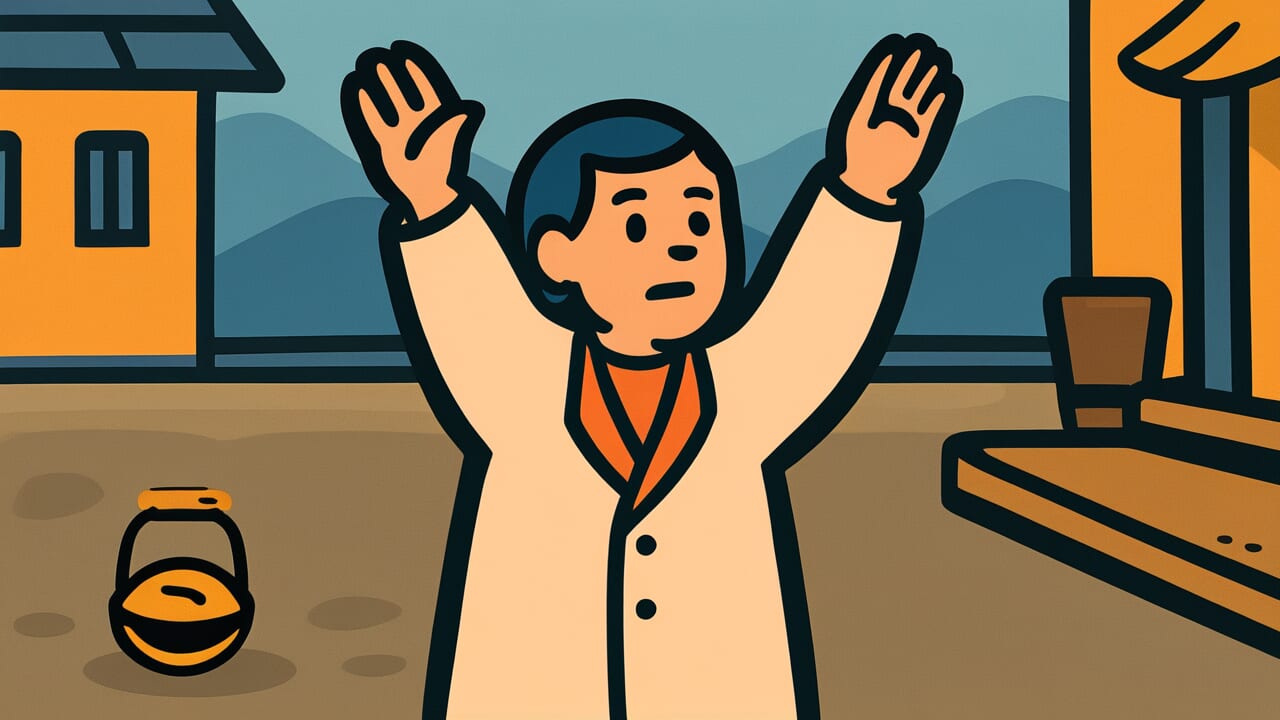How to Read “Beggars have no poverty”
Kojiki ni binbō nashi
Meaning of “Beggars have no poverty”
This proverb means that if you have no desires and feel satisfied with your current situation, your heart remains rich.
Even someone who owns nothing materially can avoid poverty of the spirit if they don’t feel “I want more” or “This isn’t enough.”
On the other hand, people who constantly feel “I still don’t have enough” remain truly poor, no matter how much wealth they possess.
This proverb teaches us that material wealth and spiritual wealth don’t always match.
Modern society often assumes that owning more things brings happiness. But this saying presents a different value: a contented heart brings true richness.
It reminds us not to be controlled by desires. Instead, we should appreciate what we already have and live with gratitude.
Origin and Etymology
The exact first written appearance of this proverb remains unclear. However, people likely used it among common folk during the Edo period.
At first glance, “Beggars have no poverty” seems contradictory. But the saying likely reflects Buddhist thought and Zen teachings.
The word “beggar” originally came from Buddhist terminology. It referred to monks who obtained food through alms begging.
These monks minimized material possessions and lived with gratitude for what they received.
Meanwhile, “poverty” didn’t simply mean having few things. It described a state where the heart feels unfulfilled and constantly senses lack.
So this proverb expresses a paradoxical truth. Those who own nothing are free from the craving for “more.” They can maintain richness of heart.
During the Edo period, this saying spread among townspeople. It served as a warning against chasing material wealth.
It also taught the importance of spiritual fulfillment. The phrase sounds like a Zen riddle, expressing the Buddhist ideal of desirelessness in everyday language.
Usage Examples
- He lives simply, but like the saying “Beggars have no poverty,” he always looks calm and content
- I realized I’d be happier appreciating what I have now, with the mindset of “Beggars have no poverty,” rather than wanting this and that
Universal Wisdom
Most human unhappiness comes not from actual lack, but from the feeling of lack.
This proverb has been passed down through generations because it sharply captures the essence of the human heart.
We suffer from the sensation of “not enough.” Not enough money, not enough time, not enough ability.
But if we think calmly, we rarely lack so much that we can’t survive. Usually, our hunger comes from comparing ourselves to others or always aiming higher.
The deep insight of “Beggars have no poverty” is this: poverty is not an objective state but a subjective feeling.
In the same situation, one person feels satisfied while another feels dissatisfied. The difference comes not from how much they own, but from their mindset.
Humans are creatures of desire. That’s not inherently bad.
But will we be controlled by desire and suffer from endless thirst? Or will we look at what we have and find peace of mind?
This choice has confronted humanity throughout every era. Our ancestors understood that true richness exists not outside but inside.
That’s the timeless life wisdom contained in this proverb.
When AI Hears This
When we view the position of beggars through an information network lens, a surprising structure emerges.
They don’t belong to fixed locations or organizations. This gives them unusually frequent contact with people from different social classes who normally wouldn’t interact.
Sociologist Granovetter proposed the theory of “the strength of weak ties.” According to this, weak connections actually bring more new information and opportunities than intimate relationships.
In other words, beggars occupy a rare position with access to diverse information sources, from the wealthy to the poor, from merchants to officials.
From an information theory perspective, value arises from information asymmetry. Information everyone knows has no value, but information only certain people possess has great value.
Beggars can accumulate fragmentary information while moving around: local rumors, business trends, people’s worries. By combining these pieces, they can see a complete picture invisible to settled residents.
More importantly, beggars have no property or social status to protect. This means they can freely exchange information.
They don’t need to worry about trade secrets or saving face. This high degree of information flow freedom offsets actual poverty.
Even with few possessions, by functioning as a node in information networks, they can always secure access routes to resources needed for survival.
Here lies the paradox: poverty is not lack of possessions but lack of access to information.
Lessons for Today
“Beggars have no poverty” teaches us that happiness isn’t something to chase. It’s something to notice.
When you open social media, you see someone’s glamorous life. Your own life might suddenly seem dull. But is that because you’re truly poor?
The key is escaping the comparison trap. Don’t look at what your neighbor has. Look at what you already possess.
A roof over your head, warm meals, trustworthy friends, a healthy body. Among things you take for granted, immeasurable richness hides.
Of course, having ambition is wonderful. But it should come from positive feelings like “I’m already enough, but I want to grow more.”
It shouldn’t come from dissatisfaction that “what I have now isn’t enough.”
Richness of heart can’t be measured by bank account numbers. If you can feel “I have enough” for one day, you’re already sufficiently rich.
That peace of mind might be the truest luxury of all.



Comments